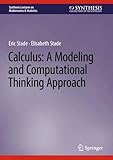Calculus: A Modeling and Computational Thinking Approach [electronic resource] / by Eric Stade, Elisabeth Stade.
By: Stade, Eric [author.] .
.
Contributor(s): Stade, Elisabeth [author.] | SpringerLink (Online service)
| SpringerLink (Online service) .
.
Material type:  BookSeries: Synthesis Lectures on Mathematics & Statistics: Publisher: Cham : Springer International Publishing : Imprint: Springer, 2023Edition: 1st ed. 2023.Description: XII, 274 p. 70 illus., 42 illus. in color. online resource.Content type: text Media type: computer Carrier type: online resourceISBN: 9783031246814.Subject(s): Mathematics
BookSeries: Synthesis Lectures on Mathematics & Statistics: Publisher: Cham : Springer International Publishing : Imprint: Springer, 2023Edition: 1st ed. 2023.Description: XII, 274 p. 70 illus., 42 illus. in color. online resource.Content type: text Media type: computer Carrier type: online resourceISBN: 9783031246814.Subject(s): Mathematics1. A Context for Calculus -- 2. The Derivative -- 3. Differential Equations -- 4. Accumulation functions and the integral -- 5. Techniques of Integration.
This book is a first-semester course in calculus, which begins by posing a question: how we do we model an epidemic mathematically? The authors use this question as an immediate, natural motivation for the study of calculus, and an immediate, natural context through which central calculus notions can be understood intuitively. The book's approach to calculus is contextual and based on the principle that calculus is motivated and elucidated by its relevance to the modeling of various natural phenomena. The authors also approach calculus from a computational perspective, explaining that many natural phenomena require analysis through computer methods. Because of this, the book also explores some basic programming notions and skills.


There are no comments for this item.